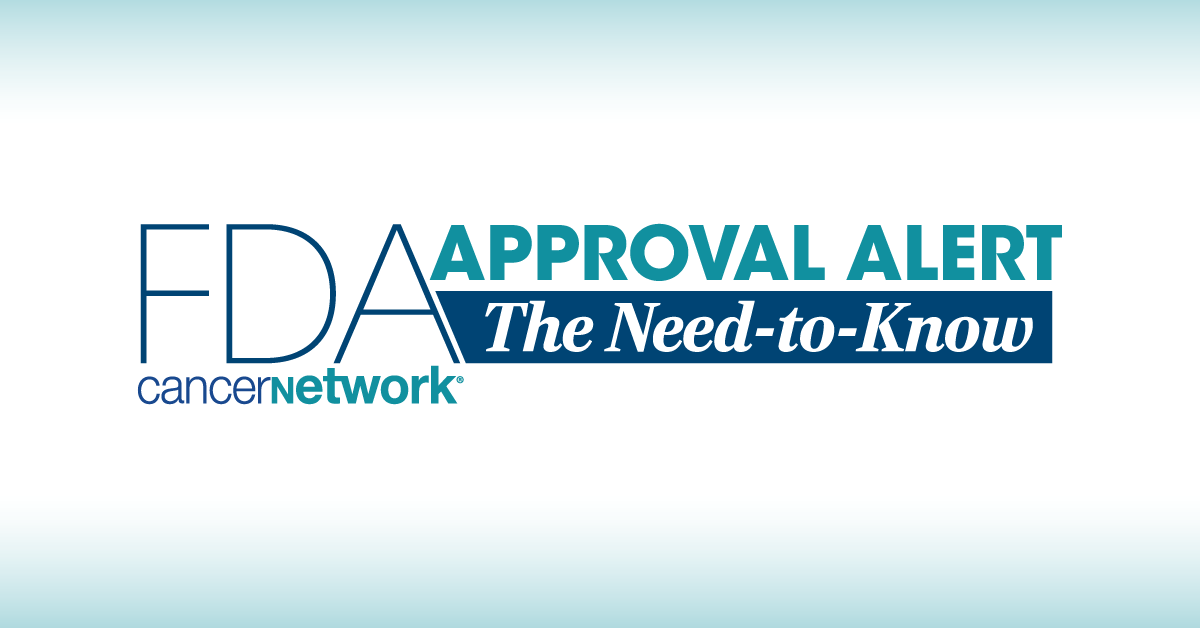FDA Approves Denileukin Diftitox in R/R Cutaneous T-Cell Lymphoma
After a complete response letter and a subsequent biologics license application resubmission, denileukin diftitox has been approved by the FDA.
The approval is based on data from the single-arm phase 3 Study 302 (NCT01871727).

The FDA has approved denileukin diftitox-cxdl (Lymphir) for patients with relapsed/refractory cutaneous T-cell lymphoma (CTCL) after 1 prior line of systemic therapy, according to a press release from the developer, Citius Pharmaceuticals, Inc.1
The approval is based on data from the single-arm phase 3 Study 302 (NCT01871727). Patients received an intravenous infusion over 60 minutes plus or minus 10 minutes on 5 consecutive days during each cycle of 21 days.2
According to topline data from the study, the objective response rate (ORR) per independent review committee (IRC) assessment was 36.2% (95% CI, 25.0%-48.7%), which included complete responses (CRs) in 8.7%. Treatment yielded a median time to response of 1.41 months, with approximately 70% of responders experiencing benefits after 1 to 2 cycles of therapy. Additionally, 52.0% of responders had responses lasting for at least 6 months.
Of those with evaluable skin, 84.4% (n = 54/64) had skin tumor burden decreases, and 12.5% (n = 8/64) experienced complete clearing of skin disease. Additionally, clinically significant improvements in pruritus occurred in 31.7% of the study population. Investigators observed no cumulative toxicities in patients who received denileukin diftitox.
Overall, the safety profile of denileukin diftitox was comparable with prior reports of the agent. Common adverse effects (AEs) across 119 patients with CTCL who received the agent in 3 studies included transaminase increases, nausea, edema, hemoglobin decreases, and fatigue.
“As a treating oncologist, I have seen the profound negative effect on the quality of life in patients with [relapsed/refractory] CTCL. Given the long-term nature of the disease, pruritus, ulceration of the tumors, and secondary pyogenic skin infection, it is vital to get this skin involvement under control,” Francine Foss, MD, professor of Hematology and director of the Multidisciplinary T-cell Lymphoma Program at Yale Cancer Center, said in the press release.1 “[Denileukin diftitox] is the first therapeutic option in many years to offer hope of reducing skin disease, bringing us one step closer to filling the need for [patients with] CTCL, particularly those that are not able to complete or continue prior therapies.”
The primary efficacy population included 69 patients, with the primary end points being dose-limiting toxicities, maximum tolerated dose, and ORR. The secondary end points included duration of response (DOR) and time to response.
Previously published data highlighted an ORR of 36.2% (95% CI, 25.0%-48.7%) via IRC and 42.3% (95% CI, 30.6%-54.6%) via investigator assessment.2 The median DOR was 6.5 months via IRC assessment and 5.7 months based on investigator review. The median time to response was 1.41 months between both, respectively.
In July 2023, the FDA issued a complete response letter for denileukin diftitox.3 They requested developers to implement enhanced product testing and additional manufacturing controls. It was noted that no concerns relating to safety or efficacy were highlighted.
In February 2024, developers resubmitted the biologics license application (BLA) for denileukin diftitox after fulfilling the manufacturing requests from the FDA.4 In March 2024, the BLA was accepted.5
References
- Citius Pharmaceuticals receives FDA approval for LYMPHIR™ (denileukin diftitox-cxdl) immunotherapy for the treatment of adults with relapsed or refractory cutaneous T-cell lymphoma. News release. Citius Pharmaceuticals, Inc. August 8, 2024. Accessed August 8. 2024. https://tinyurl.com/5xa5za9s
- Citius Pharmaceuticals reports topline data from the pivotal phase 3 study of cancer immunotherapy I/ONTAK (E7777) for the treatment of persistent or recurrent cutaneous t-cell lymphoma (CTCL) in support of BLA submission. News release. Citius Pharmaceuticals, Inc. April 6, 2022. Accessed April 25, 2024. https://prn.to/3CaaHrV
- Citius Pharmaceuticals, Inc. receives a complete response letter from the U.S. Food and Drug Administration (FDA) for LYMPHIR™ (denileukin diftitox) for the treatment of patients with relapsed or refractory cutaneous T-cell lymphoma. News release. Citius Pharmaceuticals, Inc. July 29, 2023. Accessed April 25, 2024. http://tinyurl.com/2aub7w7b
- Citius Pharmaceuticals resubmits the biologics license application of LYMPHIR™ (denileukin diftitox) for the treatment of adults with relapsed or refractory cutaneous T-cell lymphoma. News release. Citius Pharmaceuticals, Inc. February 13, 2024. Accessed April 25, 2024. http://tinyurl.com/4hkmmamr
- Citius Pharmaceuticals announces FDA acceptance of the BLA resubmission of LYMPHIR™ (denileukin diftitox) for the treatment of adults with relapsed or refractory cutaneous T-cell lymphoma. News release. Citius Pharmaceuticals, Inc. March 18, 2024. Accessed March 19, 2024. https://tinyurl.com/49ajbseh
Highlighting Insights From the Marginal Zone Lymphoma Workshop
Clinicians outline the significance of the MZL Workshop, where a gathering of international experts in the field discussed updates in the disease state.